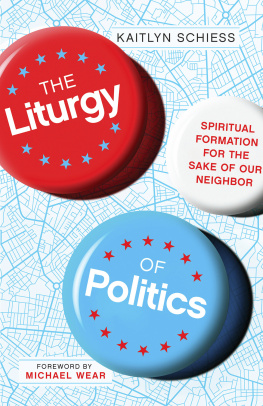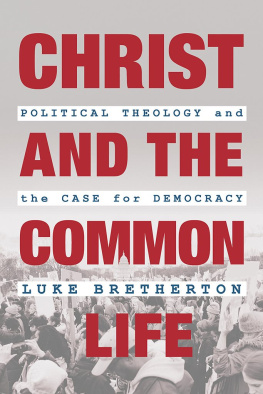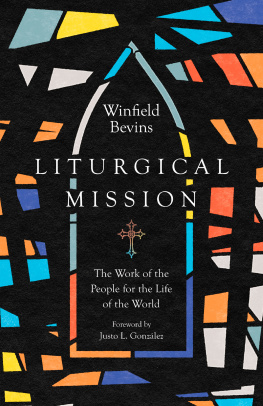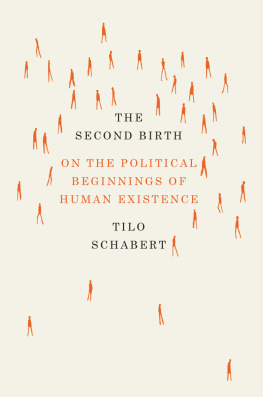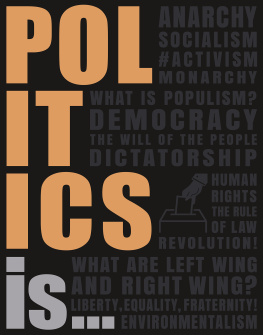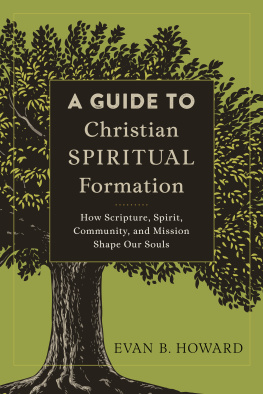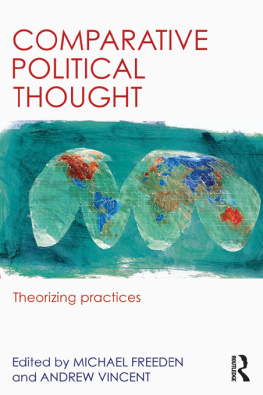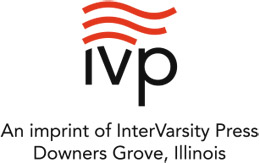Sommaire
Pagination de l'dition papier
Guide
InterVarsity Press
P.O. Box 1400, Downers Grove, IL 60515-1426
ivpress.com
2020 by Kaitlyn Schiess
All rights reserved. No part of this book may be reproduced in any form without written permission from InterVarsity Press.
InterVarsity Press is the book-publishing division of InterVarsity Christian Fellowship/USA, a movement of students and faculty active on campus at hundreds of universities, colleges, and schools of nursing in the United States of America, and a member movement of the International Fellowship of Evangelical Students. For information about local and regional activities, visit intervarsity.org.
All Scripture quotations, unless otherwise indicated, are taken from The Holy Bible, New International Version, NIV . Copyright 1973, 1978, 1984, 2011 by Biblica, Inc. Used by permission of Zondervan. All rights reserved worldwide. www.zondervan.com. The NIV and New International Version are trademarks registered in the United States Patent and Trademark Office by Biblica, Inc.
While any stories in this book are true, some names and identifying information may have been changed to protect the privacy of individuals.
Cover design and image composite: Faceout Studio
Images: city street map: Fourleaflover / iStock / Getty Images Plus
badge illustration: Francesco Zerilli/Zerillimedia/Science Photo Library
The publisher can't verify the accuracy of website hyperlinks beyond the date of print publication.
ISBN 978-0-8308-5340-3 (digital)
ISBN 978-0-8308-4830-0 (print)
This digital document has been produced by Nord Compo.
TO MY PARENTS
Of every wonderful gift youve given me,
nothing else can compare to a childhood
spent watching two faithful Christians use
their gifts for the sake of the world.
AND TO KENDRA WOO
I want to be more like you when I grow up.
Foreword
Michael Wear
Before you read this book, I want you to take a moment. Consider your expectations. Consider your posture. Our political imagination is so saturated with angry voices on talk radio and cable news, with podcasts narrowly tailored for their audience, and political campaigns that have the ability to speak to everyone and no one at all, that we often think this is all politics is and all that it ever could be. No one talks about politics, or gets involved in politics, to serve. Only the sentimental believe it to be otherwise. Politics is about winningwinning for the right reasons and the right causes is about the best we can imagine.
Before you read this book, imagine this: you are a member of a church that has decided that its life together is both influenced by and influencing politics. Just as importantly, your congregation has decided that it does not quite understand how and why this is happening or what to do about it. Given your churchs recognition that politics is both vital and not understood, you have decided as a body to commission someone to dedicate a concentrated period of study and thought to the subject and report back.
This book is that report.
That is to say, I want you to receive this book not as a challenge but as a gift. This book will read to you like an act of service, and it is refreshingly free of the kind of manipulation that is so rampant in so much of the communication about politics today. I want you to approach it with a welcoming and open spirit. You can feel safe enough to do so.
Politics, of course, is not often safe. Though we can lose sight of it as politics serves as fodder for small talk and comedy sketches, politics deals with force and harm, with systems and structures, with benefits bestowed and benefits withheld, with matters of war and welfare. If politics constituted posturing and put-downs alone, if politics was merely a forum for self-expression that we could cleanly opt out of, then Christians would certainly have better uses for their time. But for Christians, politics is not important because we ascribe great value to political ideas, but because we ascribe great value to the human person. It is because we know that politics affects our neighbors, for good and for ill, which is why you are reading this book and Kaitlyn Schiess has written it.
The word prophetic is regularly misused in conversations about faith and politics. Prophetic is often a euphemism for boldly and unapologetically calling for what I already support. It takes courage to speak into the political scene today, to ask people to be attentive to the character of our political life and the character of our lives as citizens. We think it is prophetic to condemn our political leaders, and we call for policies that stretch the boundaries of public opinion, but I believe the real prophetic call is the one issued in this book: the call to attend to the kind of people we are as we participate in politics. It is to consider spiritual formation for the sake of our neighbor.
Kaitlyn writes here as a voice for a new generation, though she reflects on old ideas and old sourcesfrom Plato to the Old Testament prophets to Augustine. With great insight, she describes some of the modern forces that have led us to this moment in our politics, and helps us to understand why evangelical political involvement looks and feels the way it does today.
It is time that we become attentive to what politics is doing to us, what it tries to do to us, and what we, wittingly or not, are doing to our politics. The formative power of politics has been a major concern of my work and life. As someone who served in the White House and worked in presidential politics, I saw the power politics can have over people and the way that the desires and affections of citizens influence how government works. I described some of this in my first book, Reclaiming Hope, in which I argued that the state of our politics is a reflection of the state of our souls. Since that book was released in 2017, I have spent a lot of time thinking about what naturally follows from that statement: our politics cannot improve in a lasting way unless its incentive structure changes, and the incentive structure that guides our politics will not fundamentally change unless we become a different kind of people.
Spiritual formation is not as enigmatic as we sometimes make it out to be. When we put our faith in Jesus, we put our whole selves under his care. Our willingness to identify with certain theological ideas is one thing, but the extent to which our life and behavior reflects actual confidence and belief in truths about God and his kingdom is another. What was most remarkable about Jesus was not just that he said things such as love your enemies, but that he actually loved his enemies. He lived as if what he said was true and real, and of course, it was. The question is whether we do the same. You have taken off your old self, Paul tells us, with its practices and have put on the new self, which is being renewed in knowledge in the image of its Creator (Colossians 3:9-10).
If we are to live as if that which we uphold as true actually is true, it must be reflected in our public lives, not just our personal lives and relationships. Our lives are not merely private, they are public too. As citizens, our lives are inescapably political.
Heres the thing about spiritual formation for public life: we can count on the Holy Spirit as our helper, just as we can for our personal spiritual formation. We can expect to see God working through and in us as we act in public, just as we expect to see the difference Christlikeness makes in our personal lives. Yes, we need to be wary of the pull that politics can have on us, but we should also have the faith to imagine the pull we can have on our politics. If a growing number of Christians decided their faith had implications for their politics, would that not change our politics? Could we not see our politics pulled toward a greater appreciation for human dignity? For justice? For humility? This is spiritual formation for the sake of our neighbors. For too long, we have only asked what politicians must do in order to meet our needs. Now, we must seek to become the kind of people our politics, and our neighbors, need.

